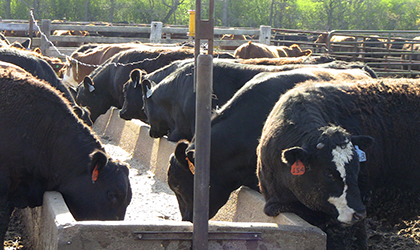2017 Animal Care Wednesday Webinars
Husbandry Practices in the Spotlight
 During the November 1st Animal Care Wednesday Webinar, we heard from Rob Eirich, Nebraska BQA (Beef Quality Assurance) Coordinator, and Doug Bear, Iowa BQA Coordinator. Both Rob and Doug have been actively involved in the industry discussions between packers, cattlemen, and industry organizations with regards to the development of a standardized on-farm assessment program. They described its importance to the beef industry, the key points of the BQA feedyard assessment, and walked through what it takes to complete it.
During the November 1st Animal Care Wednesday Webinar, we heard from Rob Eirich, Nebraska BQA (Beef Quality Assurance) Coordinator, and Doug Bear, Iowa BQA Coordinator. Both Rob and Doug have been actively involved in the industry discussions between packers, cattlemen, and industry organizations with regards to the development of a standardized on-farm assessment program. They described its importance to the beef industry, the key points of the BQA feedyard assessment, and walked through what it takes to complete it.
What are assessments?
Simply put, assessments are a review of a farm or ranch by an assessor that help managers benchmark their current level of cattle care and discover areas they may be able to improve. The BQA Feedyard Assessment looks at several areas of the operation.
- Written standard operating procedures (SOPs) for seventeen specific tasks such as a herd health plan, handling, shipping, and euthanasia.
- Complete records for treatments, health-related procedures, drug inventory, and employee training.
- Daily observations of husbandry practices such as water tanks, pen maintenance, and feed bunks, as well as observing cattle hygiene.
- Maintenance of critical areas and equipment involved in cattle care.
- Observations of handling practices while cattle are worked through a chute.
Why do an assessment?
Today’s food supply is more than just nutritious, it is a vastly interactive business with consumers constantly sharing pictures of their food creations online. Some choose to promote certain husbandry practice over others based on emotion or ethical principles instead of research and the basic human need nutritional survival. In short, consumers want to know how and where their beef is raised to be sure it is safe, high quality, and was raised humanely. Beyond the families that are the end consumer of beef, processors want verified sources of the product they distribute to maintain their creditability. Let’s be honest, beef producers desire product integrity and are proud to produce healthy beef. These BQA assessments allow producers to share about the best management practices they use every day with their cattle.
Who wants them done?
Beyond the why do them, let’s discuss who is specifically asking for the assessments to be completed.
- Consumers/retailers: McDonalds has statements regarding sustainably sourcing beef. Wendy’s has also made statements that by 2019 they desire for 90% of their beef to be from BQA certified operations.
- Processors: Tyson has the FarmCheck program that is typically completed by a 3rd party auditing company and encourages their producers to become BQA certified and implement BQA feedyard assessments. Cargill has statements that they want approximately 80% of their suppliers to complete BQA assessments by 2018. Other processors may continue to follow these industry leaders.
- Producers: Producers desire to maintain current market accessibility as well as potentially open new markets for beef. In order to accomplish this domestically or foreign, producers recognized the value of implementing best management practices and documenting their care practices.
What are the key elements?
- Acts of animal abuse or neglect. No improper handling observed and all animals have adequate water and feed daily.
- Written euthanasia SOP. It needs to be written and have a secondary method of euthanasia.
- Employee training. Annual documentation of training for each employee’s daily tasks, BQA certifications qualify, but they are every three years.
- Written SOPs. Needed for all animal care practices. To minimize the effort on writing, take two protocols each month to complete all seventeen within a year. Example documents are available in the BQA Feedyard Assessment Guide and at Nebraska BQA.
- Daily observations. All animals should be observed and cared for along with documentation. Documentation could be signing a calendar or daily bunk sheets.
- Scoring. Scoring is done on an Acceptable, Requires Action, or Unacceptable basis. However, the questions regarding animal abuse and animal neglect are scored as only Acceptable or Unacceptable.
Can you fail an assessment?
You cannot fail an assessment. Audits requested by packers, which are typically conducted by 3rd party companies, can be failed. Animal abuse or neglect needs immediate correction and reporting to management if seen during an assessment, and if seen during an audit would be grounds for failure and re-evaluation. Other areas of the assessment that are found to be unacceptable will require corrective action and may require a re-evaluation. Currently, the main area of assessments that is lacking is documentation of protocols and records.
What happens after an assessment?
Upon completion of a BQA Feedyard Assessment, the manager or owner can work with their state BQA Coordinator to submit their certification into the National BQA Assessment database. The purpose of the database is to allow packers to verify their suppliers have completed an assessment and are implementing the BQA best management practices. The database is password protected and only packers and state BQA coordinators can access the list.
Consumers desire high quality food and they want to know how and where the animals were raised. Processors are doing their role in the food chain to verify the safety of the beef they purchase and sell. The BQA Feedyard Assessment is one way cattlemen can communicate their animal care practices that go into raising safe, wholesome beef for our dinner tables.
Animal Care Wednesday Webinars
To listen to this and past webinars, visit the animal care resource website. For more information about upcoming Animal Care Wednesday Webinars, please contact Heidi Carroll.
Source: SDSU iGrow



Leave A Comment